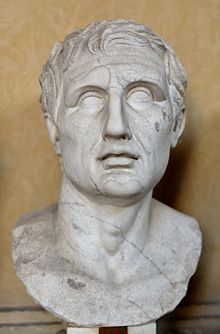
Back ميناندر Arabic ميناندر ARZ Menandru d'Atenes AST Menandr Azerbaijani Менандр Byelorussian Мэнандр BE-X-OLD Менандър Bulgarian Menandros Breton Menandar BS Menandre Catalan
Menander | |
|---|---|
 Bust of Menander. Marble, Roman copy of the Imperial era after a Greek original (c. 343–291 BC). | |
| Born | 342/41 BC Kephisia, Athens |
| Died | c. 290 BC (aged 50 – 52) |
| Education | Student of Theophrastus at the Lyceum |
| Genre | New Comedy |
| Notable works | |
Menander (/məˈnændər/; Greek: Μένανδρος Menandros; c. 342/41 – c. 290 BC) was a Greek dramatist and the best-known representative of Athenian New Comedy.[1] He wrote 108 comedies[2] and took the prize at the Lenaia festival eight times.[3] His record at the City Dionysia is unknown.
He was one of the most popular writers and most highly admired poets in antiquity, but his work was considered lost before the early Middle Ages. It now survives only in Latin-language adaptations by Terence and Plautus and, in the original Greek, in highly fragmentary form, most of which were discovered on papyrus in Egyptian tombs during the early to mid-20th-century. In the 1950s, to the great excitement of Classicists, it was announced that a single play by Menander, Dyskolos, had finally been rediscovered in the Bodmer Papyri intact enough to be performed.
© MMXXIII Rich X Search. We shall prevail. All rights reserved. Rich X Search